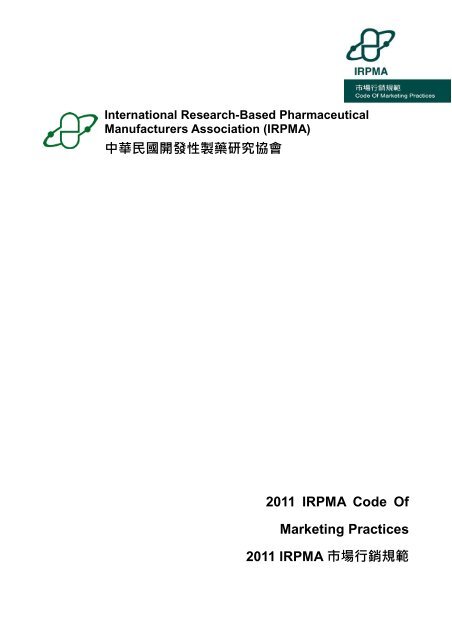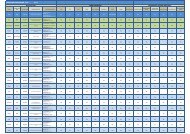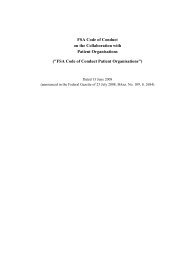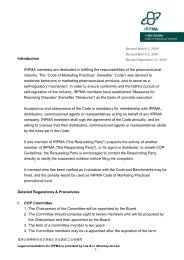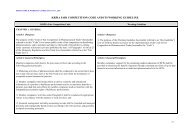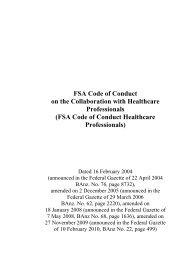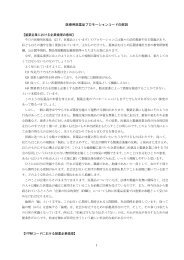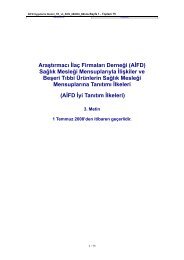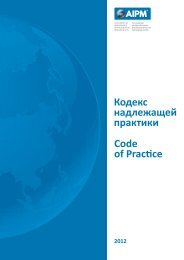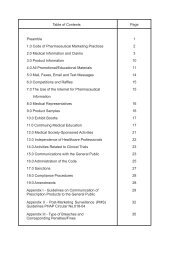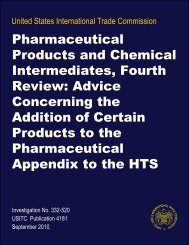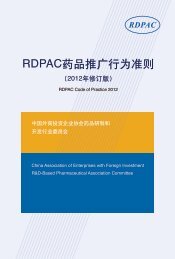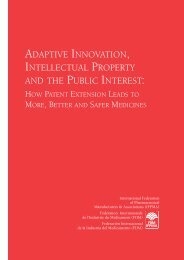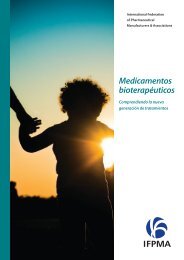IRPMA 藥品市場行銷規範 - IFPMA
IRPMA 藥品市場行銷規範 - IFPMA
IRPMA 藥品市場行銷規範 - IFPMA
- TAGS
- irpma
- ifpma
- www.ifpma.org
You also want an ePaper? Increase the reach of your titles
YUMPU automatically turns print PDFs into web optimized ePapers that Google loves.
International Research-Based Pharmaceutical<br />
Manufacturers Association (<strong>IRPMA</strong>)<br />
中華民國開發性製藥研究協會<br />
2011 <strong>IRPMA</strong> Code Of<br />
Marketing Practices<br />
2011 <strong>IRPMA</strong> 市場行銷規範
<strong>IRPMA</strong> <strong>藥品市場行銷規範</strong><br />
2011<br />
前言<br />
(i) 製藥工業研究、發展、行銷新藥以協助病患,符合倫理的處方藥行銷方式對此使命<br />
深具影響。符合倫理的行銷方式能確保醫護人員可取得所需資訊、病患得以使用所<br />
需藥物,並保障處方開立及藥品使用係以病患最大醫療利益為原則。<br />
(ii) <strong>IRPMA</strong>及其會員致力於推廣有利於病患、廠商及醫病合作的各項教育及行銷活<br />
動;同時並亟思保障醫護人員的獨立處方權。製藥業有責任與義務提供醫護人員正<br />
確的產品資訊及相關教育,使其能明確了解處方藥品的正確使用方法。廠商與醫護<br />
人員的關係必須支持並符合醫護人員對病患的專業責任。在執行行銷活動時藥廠必<br />
須維持高度的倫理標準,並遵從相關的法律規定及專業規範。藉由推廣<strong>IRPMA</strong>藥品<br />
市場行銷規範,期能建立一國際通用的倫理規範。<br />
(iii) <strong>IRPMA</strong> <strong>藥品市場行銷規範</strong>係依據International Federation of Pharmaceutical<br />
Manufacturers & Associations (<strong>IFPMA</strong>) 2007年之版本,訂定廠商對醫護人員進行<br />
藥品行銷的道德標準,並提供與醫護人員互動的依據。自2007年1月1日起,本規<br />
範將取代2003年公佈的版本。<strong>IRPMA</strong>會員公司須於2007年1月1日之前,將此新規<br />
範導入各公司現行規範。<br />
(iv) <strong>IRPMA</strong><strong>藥品市場行銷規範</strong>內容包括:適用範圍及指導原則(第1~2條)、行銷資訊<br />
內容(第3~6條)、醫護人員互動(第7~8條)、會員公司之程序及責任(第9條)、<br />
作業及執行(第10條)。<br />
(v) <strong>IRPMA</strong><strong>藥品市場行銷規範</strong>符合本地法令的規範。<br />
(vi) <strong>IRPMA</strong>會員公司有義務處理並改正任何違反相關規範之情形。會員公司的內部組<br />
織與程序(包括員工訓練)須能確保各項行銷活動妥靠且符合倫理。非<strong>IRPMA</strong>會員<br />
亦可選擇採行<strong>IRPMA</strong><strong>藥品市場行銷規範</strong>與其申訴處理程序。<br />
(vii) <strong>IRPMA</strong>開放接受任何與<strong>IRPMA</strong><strong>藥品市場行銷規範</strong>相關且符合作業程序的真實申<br />
訴。經調查,若有違反<strong>IRPMA</strong><strong>藥品市場行銷規範</strong>情事,將以迅速改正違規事項為處<br />
理目標。<br />
(viii) <strong>IRPMA</strong>為一非營利性之非官方組織,會員包括歐、美、日、台開發性製藥公司。<br />
所有會員公司及其代理商、經銷商都須遵守本規範所訂之倫理標準。<br />
* * * * *<br />
2
<strong>IRPMA</strong> <strong>藥品市場行銷規範</strong><br />
1. 目的與適用範圍:<br />
1.1 目的:<strong>IRPMA</strong><strong>藥品市場行銷規範</strong>訂定以醫護人員為對象的藥品行銷倫理標準,以確<br />
保會員公司與醫護人員之互動適當得宜。<br />
1.2 適用範圍:<strong>IRPMA</strong> 規範適用範圍<br />
• 「藥品」係指所有須按處方或由醫護人員指導使用之藥物或生物製劑(無關專利<br />
或品牌),或應用於診斷、治療或預防人體疾病、或能影響人體構造或機能者。<br />
• 「促銷」係指由會員公司執行、舉辦或贊助之直接以醫護人員為對象的藥品推廣<br />
活動,包括透過各種媒體(含網路)推廣處方或推薦、供應或指示使用某產品。<br />
• 「醫護人員」係指所有醫學、牙醫、藥劑或護理等專業人員,其專業職責包含開<br />
立處方、推薦、採購、供應藥品或給藥等項目。<br />
• 「會員公司」指所有<strong>IRPMA</strong>團體會員、個人會員及其代理商、經銷商。<br />
1.3 排除範圍:以下活動不在本規範限制範圍之內<br />
• 不須處方之自我醫療OTC藥品行銷活動<br />
• 價格或其他藥品供應之交易條件<br />
• 醫護人員確實提供給會員公司的顧問或其他服務<br />
• 臨床試驗之執行<br />
• 由會員公司提供之非行銷性資訊<br />
2. 總則<br />
2.1 互動基礎:會員公司與醫護人員之關係須以病患福利與促進醫療為基礎。互動關係<br />
須著重於提供醫護人員產品訊息、科學和教育資訊,並支持醫學研究與教育。<br />
2.2 醫護人員之獨立性:不得對醫護人員以財務或任何形式的利益(包括獎助金、獎學<br />
金、補助、贊助、顧問契約或提供教育或醫療相關用品)換取對方開立處方、推薦、<br />
採購、供應藥品、給藥,或任何促銷產品的相關義務。亦不得以任何方式影響醫護<br />
人員開立處方。<br />
2.3 適當的用途:藥品行銷必須提供客觀、不誇大的產品資訊,以鼓勵適當的藥品使用。<br />
2.4 當地法規:會員公司須遵守所有相關的法律、當地的法規和產業規範等。會員公司<br />
有義務在進行行銷活動前,事先查詢當地的規定。<br />
3
2.5 透明的行銷:行銷活動不可矯飾偽裝。會員公司不能以臨床試驗、上市後監視、體<br />
驗計畫,授權後研究等包裝藥品行銷活動。此類研究、計畫和評估之執行必須以科<br />
學或教育為主要目的。不論是否具有行銷性質,任何由公司贊助的有關藥品及其用<br />
途的資訊,均須明確註明贊助廠商。<br />
3. 查驗登記前的傳播與標示外用途:尚未取得該國許可前,任何藥品不得行銷販售及使用。<br />
然而,此條款並不意謂欲限制醫療界及民眾取得科學和醫學發展的資訊,也不欲限制有<br />
關醫藥資訊之交流,包括:在學術會議中,對學術雜誌或一般大眾媒體發佈研究結果。<br />
同時,亦非限制對股東揭露產品相關訊息,或依據其他相關法律及規定,在對產品有所<br />
疑慮時,必須揭露產品資訊。<br />
4. 行銷訊息的標準<br />
4.1 產品訊息的一致性:藥品標示、包裝、仿單、資料、行銷文件等,其格式和內容通<br />
常受各國的法律規範限制。行銷活動內容應與當地核可之產品訊息一致。<br />
4.2 正確、不誤導:行銷資訊應該清晰、易懂、正確、平衡、公正、客觀、完備,使資<br />
訊接受者能獨立判斷該藥品的治療效果。行銷訊息須基於最新的科學實據,並清楚<br />
呈現,不得扭曲、誇大、渲染或漏失以誤導讀者。更應避免語意模糊,謹慎使用絕<br />
對或概括性的敘述,並須適當舉證。盡量避免使用「安全」、「無副作用」等詞彙;<br />
使用時須提出佐證。<br />
4.3 實證:行銷內容應有實據基礎,例如核可之標示或科學證據。對醫護人員正當提出<br />
之要求,會員公司須提供相關證明以回應,並秉持客觀態度,確實提供適當的資料。<br />
5. 行銷用印刷品:<br />
優先遵從當地法規。<br />
5.1 所有行銷用印刷品(包括廣告):<br />
除條文5.2所述外,所有行銷用印刷品必須清晰易懂,並包含下列資訊:<br />
• 產品名稱(通常為品牌名稱)<br />
• 主要成分(使用其核准之名稱)<br />
• 藥廠或其代理廠商之名稱與地址<br />
• 本廣告的製作日期<br />
• 「簡短的處方資訊」,包括核准的適應症、劑量、使用方法、禁忌、副作用等說明<br />
4
5.2 提醒性廣告:提醒性廣告指僅包含產品名稱與其適應症治療類別之簡短處方訊息。<br />
提醒性廣告可免遵守條文5.1所述規定。<br />
6. 電子資訊(包括影音資訊):印刷品之相關規定亦適用於電子行銷資訊。藥品相關網站尤<br />
其應遵守以下規定:<br />
• 藥廠和目標受眾應明確<br />
• 內容適合目標受眾<br />
• 呈現方式(內容、連結等)明確且適合目標受眾<br />
• 資訊需符合當地法律規定<br />
7. 與醫護人員的互動<br />
7.1 活動<br />
7.1.1 科學及教育目的:由廠商舉辦或贊助醫護人員之專題研討會、學術討論會及各<br />
項行銷、科學或專業會議(統稱「活動」),均須以告知醫護人員產品訊息或提<br />
供科學或教育資訊為主要目的。<br />
7.1.2 國外活動:除非基於安全和合理考量,廠商不得主辦或贊助國外活動(包括贊<br />
助個人參加國外活動,見條文7.2)。邀請各國人士參加的國際科學討論會議和<br />
專題研討會則不在此限。<br />
7.1.3 活動中之行銷資訊:於國際科學討論會和專題研討會現場發送或於展示攤位提<br />
供的產品行銷資訊,可包括尚未於會議所在國登記上市或以不同條件登記的藥<br />
品資訊;惟須符合以下規定:<br />
• 此會議必須確實為國際科學會議,非主辦國之講者及與會者須佔顯著比率<br />
• 尚未於主辦國登記上市之藥品行銷資料(不含促銷用品)須列出該藥品目前<br />
已核准上市的國家,並說明該產品目前在該國仍不可取得<br />
• 含處方訊息之行銷資料,若與主辦國核准之處方訊息(適應症、警告語等)<br />
不一致時,須特別註明此訊息與該國登記條件不同<br />
• 說明文件須列出該藥品已登記的國家,並指出在主辦國內尚無法取得<br />
7.2 贊助:會員公司可贊助醫護人員參與各項活動,但須遵守下列原則:<br />
• 該活動須符合條文7.5有關款待之規定<br />
• 對醫護人員的贊助僅限於旅費、食宿及註冊報名費用<br />
5
• 不得補償醫護人員因參加會議所費時間的損失<br />
• 不得以贊助行為交換醫護人員開立處方或推薦、促銷藥品的義務<br />
7.3 同行者:廠商不得支付與受邀醫護人員同行者的任何費用。<br />
7.4 主講人與演講者酬勞:可給付應邀演講的醫護人員適當酬勞和相關之旅行、食宿墊<br />
付費用;惟雙方須簽訂書面契約。<br />
7.5 款待<br />
7.5.1 適當的地點:所有的活動均須在適當的地點舉辦,以配合其科學與教育目的。<br />
廠商應該避免選擇有名或豪奢的場地。其他規定請見本規範第七條。<br />
7.5.2 款待的限制:款待應侷限於附加於活動本身的點心或餐點,並符合下列規定:<br />
• 僅提供與會者,不包括同行人士<br />
• 款待須為當地可接受的程度<br />
7.5.3 一般而言,醫護人員接受的款待不應超過其願意自費負擔的水平。<br />
7.5.4 娛樂:會員公司不得提供單獨的餘興節目或社交活動來招待醫護人員。用餐時<br />
的簡單娛樂是可接受的,但其重要性不得超過餐點本身。<br />
7.6 贈品與醫療物品<br />
7.6.1 金錢: 不得提供醫護人員金錢或其他金錢形式的贈品(如:禮券)。<br />
7.6.2 個人餽贈:不得餽贈個人用品(如音樂CD、DVD、運動比賽或表演門票、電子<br />
產品等)。<br />
7.6.3 行銷贈品:廠商可提供醫護人員或相關行政人員促銷贈品或幫助提示產品的物<br />
品,但須為價格低廉且與醫療行為相關的小物品。<br />
7.6.4 醫療用品:廠商可提供對醫療服務或病患有益的低價醫療用品。<br />
7.6.5 習俗性餽贈:依各國習俗,廠商可在重要節慶致送醫護人員禮品,此贈品內容<br />
可與醫療無關,但是送禮次數不可頻繁,價格不可昂貴,且必須符合當地法律<br />
規定。<br />
6
8. 樣品<br />
8.1 樣品:在符合當地法規情形下,廠商可免費提供醫護人員藥品樣品,以增進病患照<br />
護。樣品不得轉售或移作他用。<br />
8.2 監控與責任:廠商須有適當的樣品監控系統,包括監控業務人員持有的樣品。廠商<br />
不得收集臨床資訊,亦不應提供醫護人員任何酬勞。<br />
9. 會員公司的作業程序和責任<br />
會員公司應建立並維持適當的作業程序,以確保落實執行此規範及相關法規,並進行審<br />
核及監控所有行銷活動和資訊。會員公司須指派具科學或專業背景的員工負責審核所有<br />
行銷資訊;亦可指派公司資深員工負責,惟其必須採納專業意見。<br />
10. 違規、申訴及執行<br />
10.1 申訴:若有違反<strong>IRPMA</strong>行銷規範之情事,歡迎各界提出申訴。<br />
10.2 確保本規範實施的措施:<strong>IRPMA</strong>鼓勵會員公司採取適當措施,以落實此規範。<br />
7
<strong>IRPMA</strong> CODE OF MARKETING PRACTICES<br />
2011<br />
(i) The ethical promotion of prescription medicines is vital to the pharmaceutical<br />
industry’s mission of helping patients by discovering, developing and marketing new<br />
medicines. Ethical promotion helps to ensure that healthcare professionals have<br />
access to information they need, that patients have access to the medicines they<br />
need and that medicines are prescribed and used in a manner that provides the<br />
maximum healthcare benefit to patients.<br />
(ii) <strong>IRPMA</strong> and its members are committed to educational and promotional efforts that<br />
benefit patients and promotional programs and collaborations that enhance the<br />
practice of medicine. <strong>IRPMA</strong> also seeks to preserve the independence of the<br />
decisions taken by healthcare professionals in prescribing medicines to patients. The<br />
pharmaceutical industry has an obligation and responsibility to provide accurate<br />
information and education about its products to healthcare professionals in order to<br />
establish a clear understanding of the appropriate use of prescription medicines.<br />
Industry relationships with healthcare professionals must support, and be consistent<br />
with, the professional responsibilities healthcare professionals have towards their<br />
patients. Pharmaceutical companies must maintain high ethical standards when<br />
conducting promotional activities and comply with applicable legal, regulatory and<br />
professional requirements. Through the promotion of this Code, <strong>IRPMA</strong> seeks to<br />
ensure that ethical promotional practices are established worldwide.<br />
(iii) The <strong>IRPMA</strong> Code of Marketing Practices (the “<strong>IRPMA</strong> Code”) based on the <strong>IFPMA</strong><br />
Code of Pharmaceutical Marketing Practices 2007 version sets forth standards for the<br />
ethical promotion of pharmaceutical products to healthcare professionals, and for<br />
member companies’ interactions with them. Effective January 1st, 2007, this Code<br />
replaces the <strong>IRPMA</strong> Code of Marketing Practices (Update 2003). Member companies<br />
of <strong>IRPMA</strong> must incorporate this Code into existing internal codes no later than<br />
January 1st, 2007.<br />
(iv) The <strong>IRPMA</strong> Code contains provisions relating to scope, applicability and guiding<br />
principles (Articles 1-2), the content of promotional material (Articles 3-6); interactions<br />
with healthcare professionals (Articles 7-8); company procedures and responsibilities<br />
(Article 9); and operation and enforcement (Article 10).<br />
8
(v) The <strong>IRPMA</strong> Code is consistent with local laws and regulations.<br />
(vi) <strong>IRPMA</strong> member companies are accountable for addressing and correcting<br />
infringements under relevant codes. They should also ensure that internal structures<br />
and procedures (including adequate training of employees) are created to ensure<br />
responsible and ethical promotional activities. Companies not in membership with<br />
<strong>IRPMA</strong> may elect to be subject to the <strong>IRPMA</strong> Code and its complaints handling<br />
processes.<br />
(vii) The <strong>IRPMA</strong> is open to receive genuine complaints from any source on any aspect of<br />
the <strong>IRPMA</strong> Code, in accordance with its operating procedures. Where it is determined<br />
that there has been a breach of the <strong>IRPMA</strong> Code, the objective is to correct the matter<br />
as rapidly as possible.<br />
(viii) The <strong>IRPMA</strong> is a non-profit, non-governmental organization comprising European,<br />
American, Japanese, and Taiwanese research-based pharmaceutical companies.<br />
Member companies and distributors, commissioned agents or representatives acting<br />
on behalf of any <strong>IRPMA</strong> member company, are committed to the ethical standards<br />
set out in this Code.<br />
* * * * *<br />
9
THE <strong>IRPMA</strong> CODE<br />
1. Objective and Scope:<br />
1.1 Objective: The <strong>IRPMA</strong> Code sets out standards for the ethical promotion of<br />
pharmaceutical products to healthcare professionals to ensure that member<br />
companies’ interactions with healthcare professionals are appropriate and<br />
perceived as such.<br />
1.2 Scope: For the purposes of the <strong>IRPMA</strong> Code:<br />
� “pharmaceutical product” means all pharmaceutical or biological products<br />
(irrespective of patent status and/or whether they are branded or not) which are<br />
intended to be used on the prescription of, or under the supervision of, a<br />
healthcare professional, and which are intended for use in the diagnosis,<br />
treatment or prevention of disease in humans, or to affect the structure or any<br />
function of the human body.<br />
� “promotion” means any activity undertaken, organized or sponsored by a<br />
member company which is directed at healthcare professionals to promote the<br />
prescription, recommendation, supply, administration or consumption of its<br />
pharmaceutical product(s) through all media, including the internet.<br />
� “healthcare professional” means any member of the medical, dental,<br />
pharmacy or nursing professions or any other person who in the course of his or<br />
her professional activities may prescribe, recommend, purchase, supply, or<br />
administer a pharmaceutical product.<br />
� “member company” means all corporate members and individual members of<br />
<strong>IRPMA</strong> and distributors, commissioned agents or representatives acting on<br />
behalf of any <strong>IRPMA</strong> member company.<br />
1.3 Exclusions: This Code does not seek to regulate the following activities:<br />
� Promotion of self-medication products that are provided “over the counter”<br />
without prescription.<br />
� Pricing or other trade terms for the supply of pharmaceutical products.<br />
� The engagement of a healthcare professional to provide genuine consultancy or<br />
other genuine services to a member company.<br />
� The conduct of clinical trials.<br />
� The provision of non-promotional information by member companies.<br />
10
2. General Principles<br />
2.1 Basis of Interaction: Member companies’ relationships with healthcare<br />
professionals are intended to benefit patients and to enhance the practice of<br />
medicine. Interactions should be focused on informing healthcare professionals<br />
about products, providing scientific and educational information and supporting<br />
medical research and education.<br />
2.2 Independence of Healthcare Professionals: No financial benefit or<br />
benefit-in-kind (including grants, scholarships, subsidies, support, consulting<br />
contracts or educational or practice related items) may be provided or offered to<br />
a healthcare professional in exchange for prescribing, recommending,<br />
purchasing, supplying or administering products or for a commitment to continue<br />
to do so. Nothing may be offered or provided in a manner or on conditions that<br />
would have an inappropriate influence on a healthcare professional’s<br />
prescribing practices.<br />
2.3 Appropriate Use: Promotion should encourage the appropriate use of<br />
pharmaceutical products by presenting them objectively and without exaggerating<br />
their properties.<br />
2.4 Local Regulations: In all cases, all relevant laws, local regulations and<br />
industry codes must be observed and companies have a responsibility to check<br />
local requirements, in advance of preparing promotional material or events in any<br />
specific country.<br />
2.5 Transparency of Promotion: Promotion should not be disguised. Clinical<br />
assessments, post-marketing surveillance and experience programmes and<br />
post-authorization studies must not be disguised promotion. Such assessments,<br />
programmes and studies must be conducted with a primarily scientific or<br />
educational purpose. Material relating to pharmaceutical products and their uses,<br />
whether promotional in nature or not, which is sponsored by a company should<br />
clearly indicate by whom it has been sponsored.<br />
3. Pre-Approval Communications and Off-label Use: No pharmaceutical product shall<br />
be promoted for use in a specific country until the requisite approval for marketing for<br />
such use has been given in that country.<br />
This provision is not intended to prevent the right of the scientific community and the<br />
public to be fully informed concerning scientific and medical progress. It is not<br />
intended to restrict a full and proper exchange of scientific information concerning a<br />
11
pharmaceutical product, including appropriate dissemination of investigational<br />
findings in scientific or lay communications media and at scientific conferences. Nor<br />
should it restrict public disclosure of information to stockholders and others concerning<br />
any pharmaceutical product, as may be required or desirable under law, rule or<br />
regulation.<br />
4. Standards of Promotional Information<br />
4.1 Consistency of Product information: It is understood that national laws and<br />
regulations usually dictate the format and content of the product information<br />
communicated on labeling, packaging, leaflets, data sheets and in all<br />
promotional material. Promotion should not be inconsistent with locally<br />
approved product information.<br />
4.2 Accurate and Not Misleading: Promotional information should be clear, legible,<br />
accurate, balanced, fair, objective and sufficiently complete to enable the<br />
recipient to form his or her own opinion of the therapeutic value of the<br />
pharmaceutical product concerned. Promotional information should be based on<br />
an up-to-date evaluation of all relevant evidence and reflect that evidence clearly.<br />
It should not mislead by distortion, exaggeration, undue emphasis, omission or<br />
in any other way. Every effort should be made to avoid ambiguity. Absolute or<br />
all-embracing claims should be used with caution and only with adequate<br />
qualification and substantiation. Descriptions such as ‘safe’ and ‘no side effects’<br />
should generally be avoided and should always be adequately qualified.<br />
4.3 Substantiation: Promotion should be capable of substantiation either by<br />
reference to the approved labeling or by scientific evidence. Such evidence should<br />
be made available on request to healthcare professionals. Companies should deal<br />
objectively with requests for information made in good faith and should provide<br />
data which are appropriate to the source of the inquiry.<br />
5. Printed Promotional Material:<br />
Where local regulations or codes are in force which define requirements, those take<br />
precedence.<br />
5.1 All Printed Promotional Material, including Advertisements:<br />
All printed promotional materials other than those covered in 5.2 below must be<br />
legible and include:<br />
� the name of the product (normally the brand name);<br />
� the active ingredients, using approved names where they exist;<br />
12
� the name and address of the pharmaceutical company or its agent responsible<br />
for marketing the product;<br />
� date of production of the advertisement;<br />
� “abbreviated prescribing information” which should include an approved<br />
indication or indications for use together with the dosage and method of use;<br />
and a succinct statement of the contraindications precautions and side effects.<br />
5.2 Reminder Advertisements: A “reminder” advertisement is defined as a short<br />
advertisement containing no more than the name of the product and a simple<br />
statement of indications to designate the therapeutic category of the product. For<br />
“reminder” advertisements, “abbreviated prescribing information” referred to in<br />
5.1 above may be omitted.<br />
6. Electronic Materials, including Audiovisuals: The same requirements shall apply<br />
to electronic promotional materials as apply to printed materials. Specifically, in the<br />
case of pharmaceutical product related websites:<br />
� the identity of the pharmaceutical company and of the intended audience should be<br />
readily apparent;<br />
� the content should be appropriate for the intended audience;<br />
� the presentation (content, links, etc.) should be appropriate and apparent to the<br />
intended audience; and<br />
� country-specific information should comply with local laws and regulations.<br />
7. Interactions with Healthcare Professionals<br />
7.1 Events<br />
7.1.1 Scientific and Educational Objectives: The purpose and focus of all<br />
symposia, congresses and other promotional, scientific or professional<br />
meetings (an “Event”) for healthcare professionals organized or sponsored<br />
by a company should be to inform healthcare professionals about products<br />
and/or to provide scientific or educational information.<br />
7.1.2 Events Involving Foreign Travel: No company may organize or sponsor<br />
an Event for healthcare professionals (including sponsoring individuals to<br />
attend such Event as described in 7.2) that takes place outside of their<br />
home country unless it is appropriate and justified to do so from the<br />
logistical or security point of view. International scientific congresses and<br />
13
symposia that derive participants from many countries are therefore justified<br />
and permitted.<br />
7.1.3 Promotional Information at Events: Promotional information which appears<br />
on exhibition stands or is distributed to participants at international scientific<br />
congresses and symposia may refer to pharmaceutical products which are not<br />
registered in the country where the Event takes place, or which are registered<br />
under different conditions, provided that the following conditions are<br />
observed:<br />
�The meeting should be a truly international, scientific Event with a<br />
significant proportion of the speakers and attendees from countries other<br />
than the country where the Event takes place;<br />
�Promotional material (excluding promotional aids) for a pharmaceutical<br />
product not registered in the country of the Event should be accompanied<br />
by a suitable statement indicating the countries in which the product is<br />
registered and make clear that such product is not available locally;<br />
�Promotional material which refers to the prescribing information<br />
(indications, warnings etc.,) authorized in a country or countries other than<br />
that in which the Event takes place but where the product is also registered,<br />
should be accompanied by an explanatory statement indicating that<br />
registration conditions differ internationally; and<br />
�An explanatory statement should identify the countries in which the product<br />
is registered and make it clear that it is not available locally.<br />
7.2 Sponsorship: Member companies may sponsor healthcare professionals to<br />
attend Events provided such sponsorship is in accordance with the following<br />
requirements:<br />
� The Event complies with the hospitality requirements in this Code as described<br />
in 7.5;<br />
� Sponsorship to healthcare professionals is limited to the payment of travel,<br />
meals, accommodation and registration fees;<br />
� No payments are made to compensate healthcare professionals for time spent<br />
in attending the Event; and<br />
� Any sponsorship provided to individual healthcare professionals must not be<br />
conditional upon an obligation to prescribe, recommend or promote any<br />
pharmaceutical product.<br />
14
7.3 Guests: Companies should not pay any costs associated with individuals<br />
accompanying invited healthcare professionals.<br />
7.4 Payments for Speakers and Presenters: Payments of reasonable fees and<br />
reimbursement of out-of-pocket expenses, including travel and accommodation,<br />
may be provided to healthcare professionals who are providing genuine services<br />
as speakers or presenters on the basis of a written contract with the company at<br />
the Event.<br />
7.5 Hospitality<br />
7.5.1 Appropriate Venue: All Events should be held in an appropriate venue<br />
that is conducive to the scientific or educational objectives and the purpose<br />
of the Event or meeting. Companies should avoid using renowned or<br />
extravagant venues. The additional requirements set forth in Article 7 of this<br />
Code also apply accordingly.<br />
7.5.2 Limits of Hospitality: Hospitality should be limited to refreshments and/or<br />
meals incidental to the main purpose of the Event and should only be<br />
provided:<br />
�to participants of the Event and not their guests; and<br />
�if it is moderate and reasonable as judged by local standards.<br />
7.5.3 As a general rule, the hospitality provided should not exceed what<br />
healthcare professional recipients would normally be prepared to pay for<br />
themselves.<br />
7.5.4 Entertainment: No stand-alone entertainment or other leisure or social<br />
activities should be provided or paid for by member companies. At Events,<br />
entertainment of modest nature which is secondary to refreshments and/or<br />
meals is allowed.<br />
7.6 Gifts and Items of Medical Utility<br />
7.6.1 Cash: Payments in cash or cash equivalents (such as gift certificate) must<br />
not be offered to healthcare professionals.<br />
7.6.2 Personal Gifts: Gifts for the personal benefit of healthcare professionals<br />
(including, but not limited to, music CDs, DVDs, sporting or entertainment<br />
tickets, electronic items) must not be provided or offered.<br />
7.6.3 Promotional Aids: Promotional aids or reminder items may be provided or<br />
15
offered to healthcare professionals and appropriate administrative staff,<br />
provided the gift is of minimal value and relevant to the practice of the<br />
healthcare professional.<br />
7.6.4 Items of Medical Utility: Items of medical utility may be offered or provided<br />
free of charge provided that such items are of modest value and are beneficial<br />
to the provision of medical services and for patient care.<br />
7.6.5 Cultural Courtesy Gifts: In some countries, if allowed under local law and<br />
in accordance with local practice, an inexpensive gift not related to the practice<br />
of medicine may be given on an infrequent basis to healthcare professional<br />
in acknowledgment of significant national, cultural or religious holidays.<br />
8. Samples<br />
8.1 Samples Permitted: In accordance with local laws and regulations, free samples<br />
of a pharmaceutical product may be supplied to healthcare professionals in order<br />
to enhance patient care. Samples should not be resold or otherwise misused.<br />
8.2 Control and Accountability: Companies should have adequate systems of<br />
control and accountability for samples provided to healthcare professionals<br />
including how to look after such samples whilst they are in possession of<br />
medical representatives. Companies should not collect clinical data and should<br />
not make any payment to physicians.<br />
9. Company Procedures and Responsibilities<br />
Companies should establish and maintain appropriate procedures to ensure full<br />
compliance with relevant codes and applicable law and to review and monitor all of their<br />
promotional activities and materials. A designated company employee, with sufficient<br />
knowledge and appropriate scientific or healthcare qualifications should be responsible<br />
for approving all promotional communications. Also, a senior company employee<br />
could be made responsible, provided that scientific advice is taken.<br />
10. Infringement, Complaints, and Enforcement<br />
10.1 Complaints: Genuine complaints relating to infringements of the <strong>IRPMA</strong> Code<br />
are encouraged.<br />
10.2 Measures to Ensure and Enforce Compliance: <strong>IRPMA</strong> strongly encourages<br />
member companies to adopt procedures to assure adherence to this code.<br />
16


